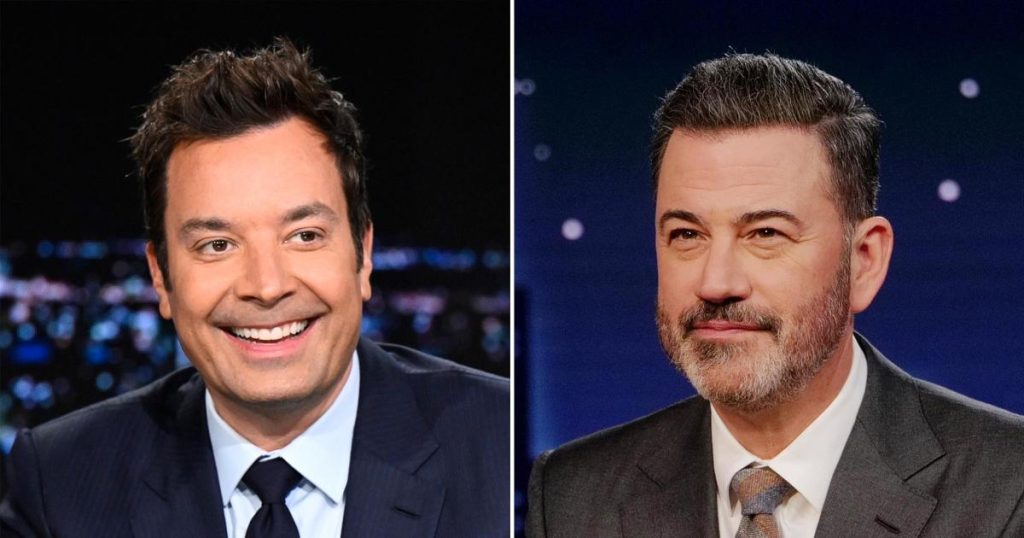Jimmy Fallon Addresses Jimmy Kimmel’s Suspension in Heartfelt Show Opener
In a surprising turn of events in the late-night television landscape, Jimmy Fallon took to the stage of The Tonight Show with a heartfelt acknowledgment of fellow host Jimmy Kimmel’s indefinite suspension from ABC. The 50-year-old Fallon opened his Thursday show addressing the elephant in the room, revealing that he had awakened that morning to a flood of concerned text messages from his father, who had mistakenly believed it was Fallon’s show that had been canceled. With genuine emotion in his voice, Fallon spoke warmly about Kimmel, describing him as “a decent, loving and funny guy,” and expressing hope for his colleague’s return to the airwaves. This moment of solidarity between late-night hosts highlighted the camaraderie that exists beneath the surface of their friendly competition, as Fallon navigated the delicate balance of acknowledging the situation while maintaining his characteristic humor.
The suspension of Jimmy Kimmel Live came after controversial comments Kimmel made regarding the late conservative political activist Charlie Kirk, who was tragically shot and killed at a Utah Valley University event on September 10. During his Monday show, Kimmel had made remarks about Kirk’s accused killer, Tyler Robinson, which sparked immediate backlash. “We hit some new lows over the weekend with the MAGA gang desperately trying to characterize this kid who murdered Charlie Kirk as anything other than one of them with everything they can to score political points from,” Kimmel had said on his show. He further criticized former President Donald Trump’s response to Kirk’s death, suggesting Trump wasn’t properly grieving when he discussed White House ballroom construction with reporters, comparing it to “how a four-year-old mourns a goldfish.” These comments led to Nexstar Media, which owns multiple TV stations, strongly objecting to Kimmel’s remarks and reportedly threatening to pull the show, culminating in ABC’s decision to suspend the program indefinitely.
Fallon’s Thursday night response to the situation carefully walked the line between showing support for his fellow host and acknowledging the gravity of the situation. After his initial comments about Kimmel, Fallon pivoted to address broader concerns about potential censorship in late-night television. “A lot of people are worried that we won’t keep saying what we want to say or that we’ll be censored,” Fallon noted, before launching into a comedic bit about former President Trump’s UK trip that featured deliberately interrupting voiceovers providing exaggeratedly positive commentary. The bit, which included lines like “incredibly handsome” and “I hereby nominate him for the Nobel Peace Prize,” served as Fallon’s tongue-in-cheek way of addressing censorship fears while still delivering his signature humor. The segment concluded with Fallon declaring, “See, we can still say what we want,” a statement that carried both humor and a subtle assertion of creative freedom in an increasingly tense media landscape.
The timing of Kimmel’s suspension and Fallon’s response came amid a particularly divisive political climate in the United States, with the presidential election looming and tensions running high across the political spectrum. Kirk’s murder had already become a flashpoint in political discourse, with various factions attempting to contextualize the tragedy within their own narratives. Kimmel’s comments, which some viewed as insensitive given the circumstances of Kirk’s death, touched on this raw nerve at a moment when public figures’ statements are scrutinized more closely than ever. The accused killer, Tyler Robinson, currently faces serious charges including capital offense aggravated murder, felony discharge of a firearm, obstruction of justice, witness tampering, and commission of a violent offense in the presence of a child. Against this backdrop, Kimmel’s commentary struck many as crossing a line, particularly in how it appeared to politicize a tragedy that had left a family and community grieving.
Adding another layer to the unfolding drama, Fallon himself made headlines hours before his show aired when he unexpectedly withdrew from a scheduled appearance at the Fast Company Innovation Festival in New York City. Fallon had been set to discuss his new NBC series, On Brand, alongside Bozoma St. John, but the festival released a terse statement announcing, “Unfortunately, Jimmy Fallon is no longer able to attend today’s session.” Festival representatives declined to provide further details about the situation, leaving media outlets and fans to speculate about whether Fallon’s cancellation might be connected to the broader turbulence affecting late-night television. This timing created an additional undercurrent of tension as viewers tuned in to see how Fallon would address the Kimmel situation on his own show later that evening, wondering if there might be new developments affecting The Tonight Show as well.
The suspension of Jimmy Kimmel Live represents a significant moment in the evolution of late-night television, which has increasingly become a space where hosts navigate complex political and social issues alongside their traditional comedy and celebrity interviews. Where once late-night was primarily a venue for light entertainment, shows hosted by figures like Kimmel, Fallon, Stephen Colbert, and others now regularly feature commentary on current events that can generate significant controversy. This shift has placed hosts and networks in the challenging position of balancing free expression with sensitivity to diverse audiences and advertiser concerns. As Fallon noted in his Thursday night monologue, many are worried about potential censorship in this realm, a concern that speaks to broader anxieties about the parameters of acceptable discourse in American media. While ABC has only stated that Kimmel’s show is “pre-empted indefinitely,” with Celebrity Family Feud airing in its place, the incident serves as a reminder of the precarious position occupied by public figures who comment on divisive issues in today’s fractured media landscape, where a single controversial statement can have swift and significant consequences.


